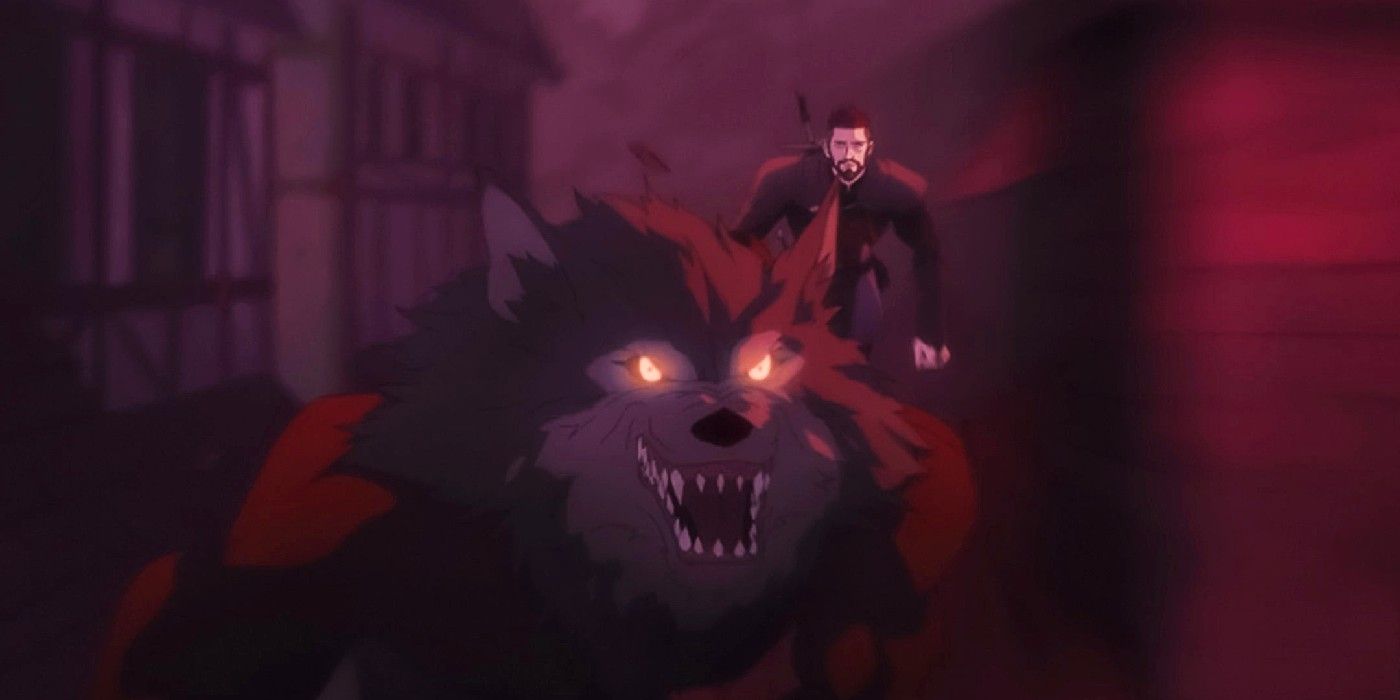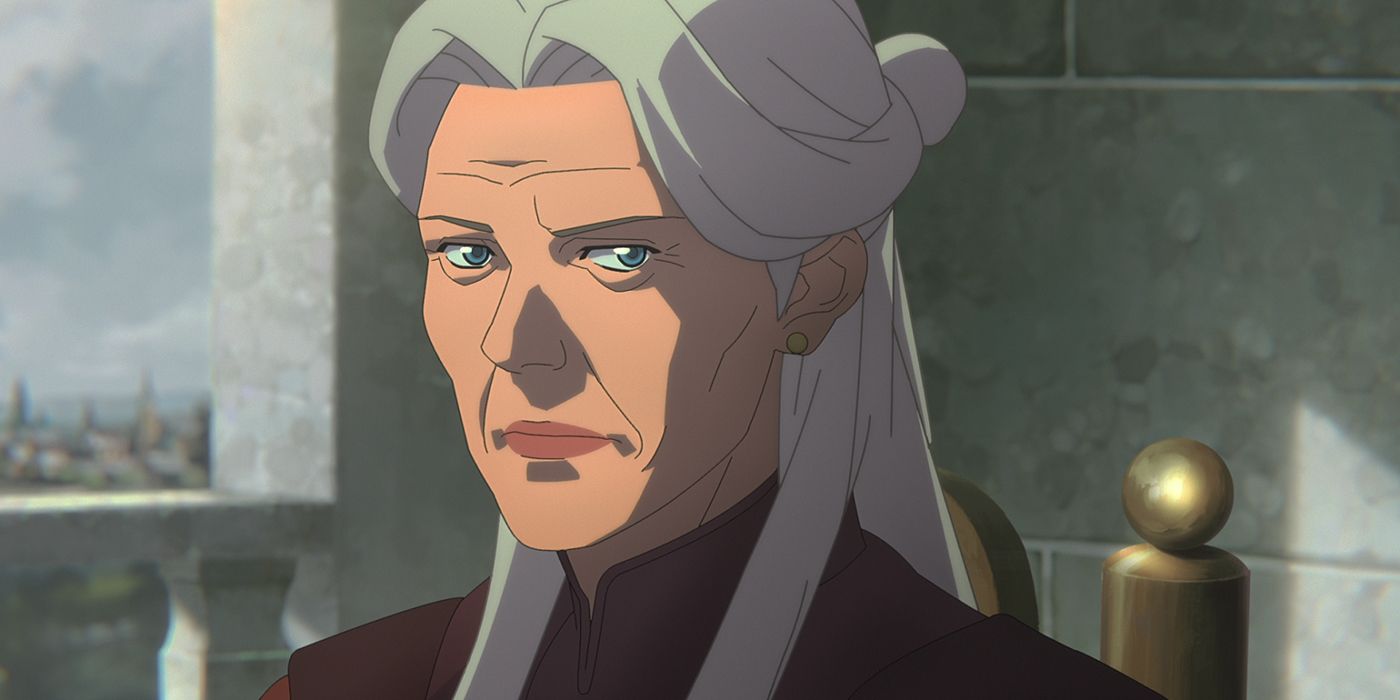
The Witcher: Nightmare of The Wolf may appear to some as a palette cleanser before the hit Netflix series returns for a second season, but it goes far beyond that. The animated film from Studio Mir, which arrives on the streaming platform August 23, provides a great deal of context for Geralt's upbringing by introducing us to his Witcher mentor, Vesemir (voiced by Theo James).
Not only that, this prequel to The Witcher - not to be confused with the upcoming Blood Origin starring Michelle Yeoh - also puts the fear and suspicion surrounding Geralt's profession into perspective. To top it all off, it exposes audiences to a great deal of monster hunters instead of the lone grumpy one they've become accustomed to and his noble steed.
Screenwriter Beau DeMayo, who also writes for the series proper alongside showrunner Lauren Schmidt Hissrich, spoke to Screen Rant about crafting a film that could act as an enhancement for the world while also standing apart from the show.

Screen Rant: How did the idea to do an animated prequel specifically for Vesemir happen?
Beau DeMayo: When Lauren first came to me, the general prerogative was to tell an animated Witcher film, and where do we want to go with that? And it was awesome, because she just entrusted me with, "What interests you?"
And so I came back to Lauren with a couple of ideas - which I will not spoil here - of areas of The Witcher lore that, if you're reading the books, you're probably curious about. I think something that [Andrzej] Sapkowski did very well was give this kind of mystique to areas of The Witcher and the continent that are still mysteries. It's like the Lindbergh baby, "Ooh, something happened there. We don't talk about that."
I was coming back with a couple of ideas that, as a fan, I was curious about knowing - and I think that fans would be curious about knowing. Then Vesemir was a natural pick just because Witcher is ultimately a story about families, and parents finding children in the unlikeliest of places. When you look at parenting styles, we learn how to be parents from our parents, for better or for worse. Geralt is ultimately a father figure to Ciri; he is a man who did not ask to be this young lady's father.
And so, it only seemed natural to go back and ask, "Who raised Geralt? Who was responsible for the grumpiest Witcher on the planet?" We're answering that question in a way that I think will both surprise fans but also really make sense to fans.
I love that you said that. In just the opening sequence, you can already see how different Vesemir is from Geralt. Was his demeanor something took take from the novels or his upcoming season 2 performance? How do you decide Vesemir's personality?
Beau DeMayo: Yeah. I'm a huge fan of Zorro. And I know this is gonna sound weird but, for some reason, I just came at it looking at my own father and how different he and I are. I was looking at Vesemir as a bit of a - Lauren says rapscallion, I say swashbuckler.
One of my favorite movies growing up was Zorro, The Gay Blade. That flamboyant, devil-may-care attitude was an invention of my own. And I don't know why or how I got there, but I wanted to take a character like that and shove him into the harsh dark fantasy of the continent. It's a cruel world, and it's not a glamorous job. But we know what the Geralt of that world looks like; we know how he navigates that world: he talks to his horse, and he's very angry about it.
What if we could look at a character who's the complete opposite of that spectrum? Who comes at it, like you're saying, with a wink in his eye? In that teaser trailer, there's just a constant wink in his eye at all the crazy darkness around him. Then you go, "How the hell did this guy give birth, so to speak, to the character we know as Geralt?"
I also think that animation as a medium is such a great way of contrasting Veremir's personal lightness with the darkness of his surroundings. What was the collaboration process like with Studio Mir, and what made them the right choice?
Beau DeMayo: Their resume speaks for itself. In everything from Voltron to [Legend of] Korra, they're just amazing. The collaboration process with them was honestly so amazing - no one's gonna get on here say it wasn't.
But I can honestly say, as a writer, you want your script to be respected. Especially something like The Witcher, which is part of such a larger tapestry at Netflix. And they were just so generous and trusting, in terms of what I was excited about, in the script and for the film. But also, they just came in and fleshed it so much. It really just felt like chilling in your living room playing Witcher with a bunch of buddies and being like, "Wouldn't it be cool if...?"
Eventually, it got to that kind of collaborative process. You're just like, "We know you have this, and we want to do that. But what if we did this too?" That literally was the process, where it just became us nerding out.

The voice cast for the movie is a great combination of big names, period, and also veterans in the voice acting industry specifically. Was there any voice work you were most excited about, or any method to how this cast came together?
Beau DeMayo: Yeah, I mean, Meredith Layne was our casting director, and she's brilliant. I bow at her feet; she's amazing. She came to us with a lot of great names.
I was excited about everybody, but Mary McDonnell, as a lifelong Battlestar Galactica fan - Laura Roslyn being literally my favorite female character ever committed to any sort of medium - I wrote with her in mind for that role. The fact that she agreed to come in and do it for us is a highlight of my personal career. But that was someone who I was just like, "Wow, that's great."
Theo completely just brought the charm and charisma that we had imagined for Vesemir. Graham [McTavish] too. Everybody just brought their A-game, and a lot of that I have to say is thanks to Meredith tapping into the script and coming back to me with options.
Something that sticks with me about her method is just making sure that the voices, because it's animation, sound like they belong. They sound like they should belong in the room together, and that's probably the thing that's most exciting about the cast. I think, when people watch the film, all the voices will fit like puzzle pieces.
Without spoilers, would you say that there are any points from Nightmare of the Wolf that season 2 might touch on? Or that, if you watch this, you'll get more information you need in season 2?
Beau DeMayo: Yeah. I can't give spoilers, but I will say that both season 1 and season 2 are enriched by the anime. It's not needed but definitely recommended. And I do think there is a more complete story that you will get, having watched the anime.
Again, that was probably one of the trickier things: making it something that stood on its own and felt significant to Witcher fans, but that if you didn't watch, you weren't going to go into season 2 thinking you missed something. Like a, "Do we need to do a Previously On?" kind of thing.
But I definitely think that for people who do watch it - both fans and non-fans, or animation fans and Witcher fans alike - it's going to enrich your experience of season 2.
You mentioned Mary McDonnell, who plays Lady Zerbst, and I adore her in this. But Tetra (Lara Pulver) is another magnificently written character. Again, no spoilers, but what was it like to create these two complex women and really flesh out their opposing viewpoints on the world and Witchers?
Beau DeMayo: Tetra is very close to my heart, just being a character that we don't find in the canon. I think when you have people who are purists and believe in the purity of any ideology - and, in her case, it's magic - it is sometimes easy to ridicule people's sincerity and earnestness when it comes to their belief system. And I think what was interesting about Tetra was telling a story about a woman that wasn't about her being a woman, if that makes sense. It is just about a person who believes very purely in a set of ideals and is mocked for it, and that was where I came from with that character.
Yennefer has a very specific journey in The Witcher that is very much rooted in womanhood. I wanted to flip the script a little bit and tell a story that is [different]. There are shades of what it's like to be a woman in the Continent - you can't divorce that any more than you could divorce me being Black in this world. But it doesn't mean that needs to be the entire focus of the story; it can just be part of the tapestry of the story. But what the tapestry is actually going to be telling you and showing you is really a story about the sincerity of belief, and when do you become trapped by your own belief system?
But it's also about having a character who can stand toe to toe with Vesemir.
The Witcher: Nightmare of the Wolf drops August 23 on Netflix.
from ScreenRant - Feed https://ift.tt/3mq72jq

0 Comments